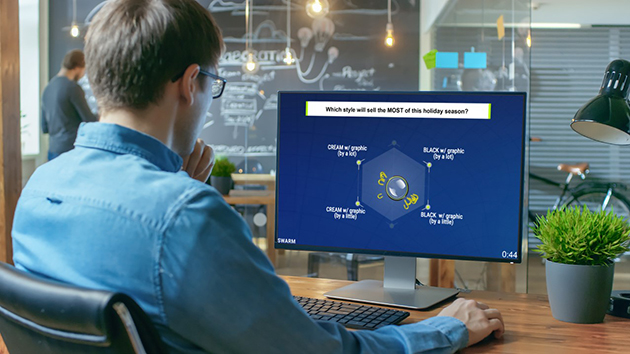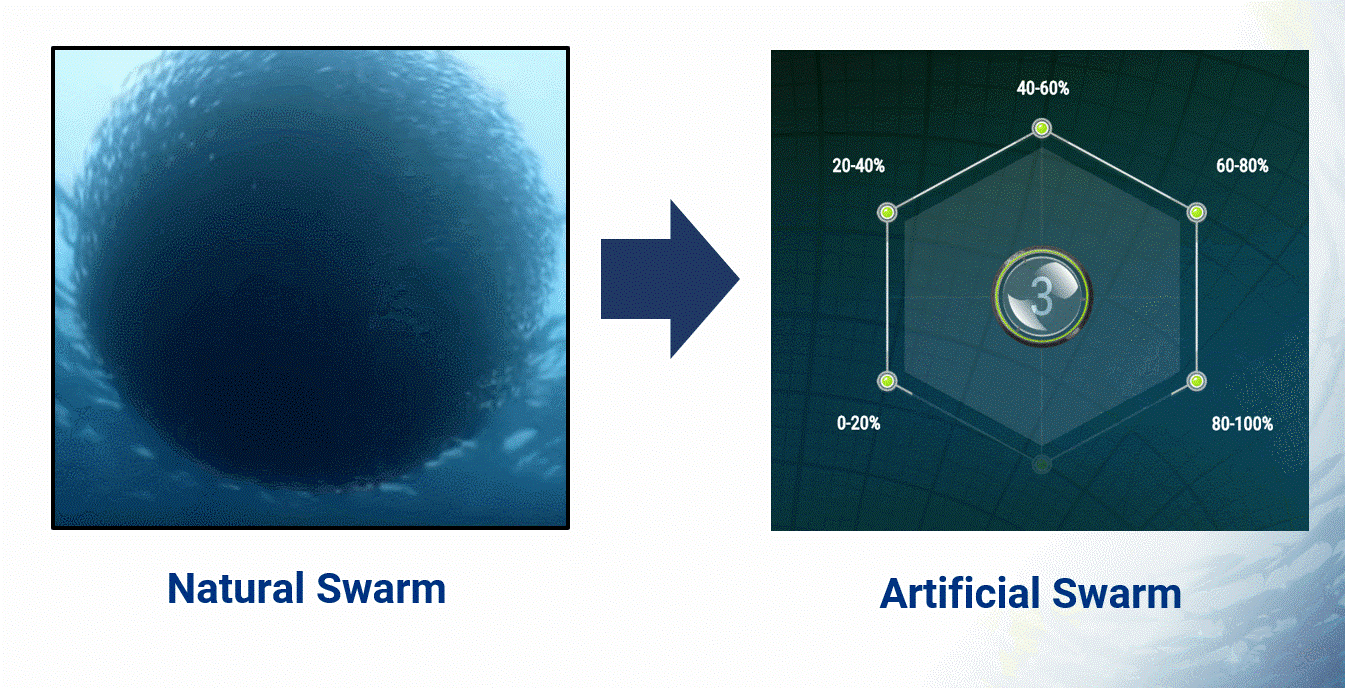
An Interview with Dr. Louis Rosenberg, CEO of Unanimous AI
From the Singularity University blog, by Charles Warnock:
Louis Rosenberg PhD, a prolific inventor, scientist, and entrepreneur, developed Swarm AI, a new technology that combines real-time human insights and AI algorithms to produce “hive minds” modeled after natural swarms, for humans to converge on optimized insights, predictions, and decisions. Dr. Rosenberg shared his thoughts with SU in this wide-ranging interview on the future of AI, trust, and how humans can amplify their intelligence and make better, faster decisions.
To set the stage, can you distinguish between neurological intelligence, Swarm Intelligence, and Artificial Swarm Intelligence?
Dr. Rosenberg: Sure. In the natural world, the process of evolution has produced two unique and powerful forms of intelligence that we know of:
- Neurological intelligence emerges by connecting large numbers of simple processing units (neurons) into complex real-time networks (brains).
- Swarm Intelligence is similar in many ways, but connects groups of intelligent organisms (brains) into complex real-time networks that biologists call swarms. A swarm is a “brain of brains” that has the capacity to function as a superintelligence, as it can significantly outperform the individual members that make up the system.
Artificial Swarm Intelligence, or simply Swarm AI, connects human groups into emergent systems moderated by AI algorithms modeled on biological swarms. An Artificial Swarm Intelligence of a human population is a “hive mind” and it can achieve superintelligent results and significantly outperform all the individual members who participate.

In nature, swarms of bees have been shown to make decisions by working together as a unified system, significantly amplifying their combined intelligence. The same is true of flocks of birds, colonies of ants, and schools of fish. With that context, most researchers working on AI have been focused on replicating neurological intelligence, building artificial systems that emulate biological neurons and the densely interconnected networks from which intelligence emerges.
Why focus on Artificial Swarm Intelligence in particular?
Dr. Rosenberg: My personal focus for the last five years has been looking at nature’s other method, Swarm Intelligence, and building artificial systems that connect groups of humans together over computer networks, enabling us to think together in systems that emulate the superintelligence that emerges from natural swarms.
Enabling humans to think together as superintelligent systems is the reason we founded Unanimous AI five years ago and the reason we created the Swarm software platform. When groups of people log into the platform, they can think together as a real-time system and quickly answer questions, make predictions, reach decisions, and prioritize objectives, converging on solutions that significantly outperform their individual abilities. While building “hive minds” from human groups sounds like science fiction, many Fortune 500 companies already use the Swarm platform to amplify the intelligence of business teams, enabling more accurate forecasts, better prioritizations, deeper insights, and optimized prioritizations.
Can business teams really form a superintelligence by thinking together, moderated by AI algorithms based on biological swarms?
Dr. Rosenberg: Unanimous AI was founded based on a simple premise that if birds and bees and fish can get so much smarter by thinking together in swarms, the same should hold true for human swarms. But it was a big unknown, as nobody had ever created human swarms before. So we built the Swarm platform (formally called UNU) and partnered with numerous top universities to rigorously test if human groups can amplify their intelligence by swarming. The results have shown significantly greater amplification of intelligence than we expected.
For example, we recently published a study with Stanford University in which groups of doctors were connected together into real-time human swarms by using the Swarm platform. They were tasked with diagnosing chest x-rays for the presence of pneumonia. The results, which were published in 2018, showed that when thinking together as a swarm, doctors reduced their diagnostic errors by over 30%.
In another study conducted with researchers at Oxford University, groups of sports fans were tasked with predicting English Premier League soccer games. The results demonstrated that when thinking together as a Swarm powered superintelligence, these regular fans were able to outperform Las Vegas betting markets. Similar amplifications of intelligence were found in numerous published studies forecasting equity markets, sales volumes, and political elections. Simply put, human swarms are very smart.
Read the rest of the interview at the link below.

Want to learn more about our Swarm AI technology? Check out our TED talk below…



